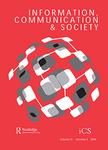版权所有:内蒙古大学图书馆 技术提供:维普资讯• 智图
内蒙古自治区呼和浩特市赛罕区大学西街235号 邮编: 010021

作者机构:Kings Coll London Dept Psychol Med London SE5 9RJ England
出 版 物:《INFORMATION COMMUNICATION & SOCIETY》 (信息、通讯与社会)
年 卷 期:2021年第24卷第15期
页 面:2244-2257页
核心收录:
学科分类:0303[法学-社会学] 03[法学] 0503[文学-新闻传播学]
基 金:National Institute for Health Research Health Protection Research Unit (NIHR HPRU) in Emergency Preparedness and Response at King's College London Public Health England (PHE) University of East Anglia Newcastle University King's College London Psychiatry, Nursing and Midwifery Research Ethics Committee [LRU-17/18-5424]
主 题:Mobile phone location data focus group discussions ambulance services public health England
摘 要:The use of mobile phone devices leaves digital traces which include personal data of the user s location and can be used to produce aggregated and anonymised location data. There is widespread interest in utilising different types of mobile phone location data to optimise emergency health responses within a range of settings, however until now there has been no qualitative research exploring public opinions on sharing such data. A qualitative study with 40 millennials (born between 1981-2000) across six focus groups were conducted before and after widespread news reports about the leaking of personal data on social media and a major public health incident in the UK. Thematic analysis was used to identify themes in the data. Analysis identified four main themes and five subthemes suggesting the main concepts related to attitudes and concerns were Control , Trust , Risks to sharing and Pros and cons of data sharing . Millennials were generally accepting of sharing different types of location data with ambulance services and a public health agency if they were able to give explicit consent and retain some personal control towards how their data would be used. The results suggest that policymakers who wish to use aggregated and anonymized mobile phone location data to improve healthcare services should focus on reassurance about how data will be used and promoting public trust.